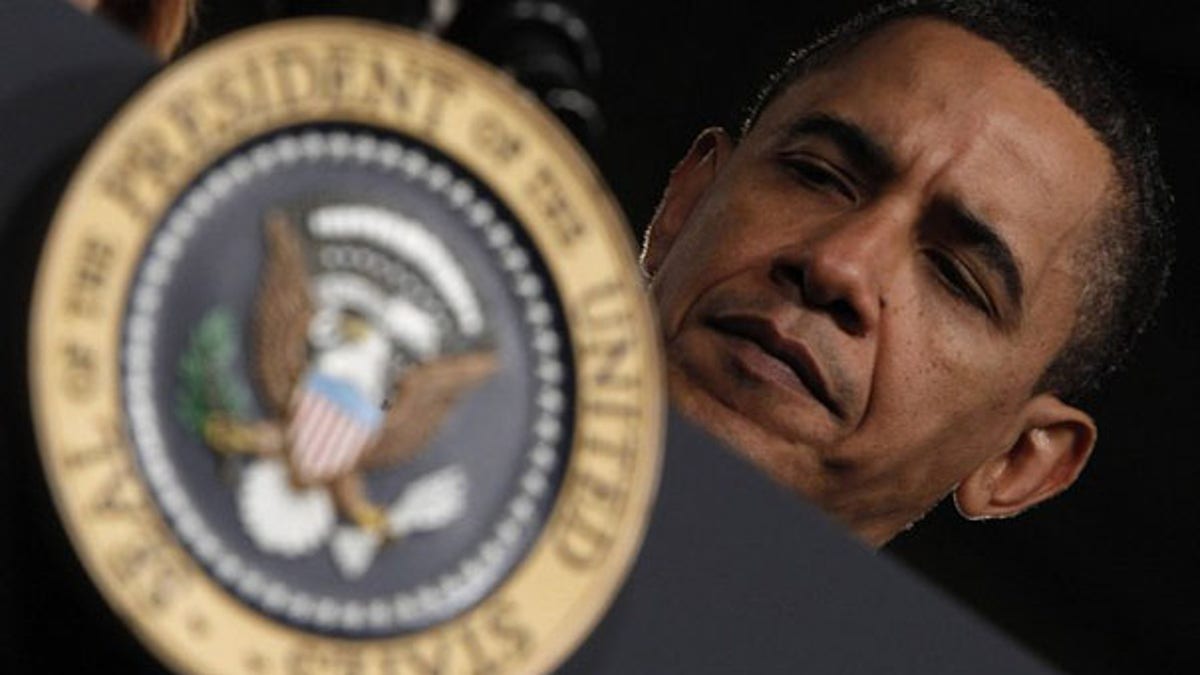
President Obama prepares to speak in Strongsville, Ohio, March 15. (Reuters Photo)
The Obama administration is drawing fierce criticism from both sides of the aisle for appearing to take dead aim at U.S. policy toward Israel by exploiting a dispute that began as a mere bureaucratic blunder.
Critics suggest the turn against Israel is the latest in a series of diplomatic shifts that appear to give other Middle Eastern nations more weight -- while top U.S. officials were applying the squeeze to America's closest ally in the region, the administration was trying to lead the first U.S. ambassador to Syria in five years through confirmation.
White House Press Secretary Robert Gibbs said Tuesday that the "unwavering commitment" to Israel is unchanged despite the escalating feud over a Jerusalem housing project.
"Mature, bilateral relationships can have disagreements, and this is one of those disagreements," he said. "It does not break the unbreakable bond that we have with the Israeli government and the Israeli people on their security."
But with Israel's ambassador calling this the worst crisis in 35 years, lawmakers and Israeli advocacy groups are accusing the administration of blowing the spat way out of proportion in order to extract concessions -- jeopardizing the vital relationship with Israel and aiding America's "enemies" in the process.
"These matters need to be thought through before public pronouncements can significantly damage the U.S.-Israeli relationship and give aid and comfort to the enemies of the Mideast peace process," Sen. Arlen Specter, D-Pa., said Tuesday on the Senate floor.
The disagreement originally flared up after a mid-level Israeli official announced plans for 1,600 apartments in East Jerusalem while Vice President Biden was visiting. Biden, in response, issued a stern statement condemning the action. Israel apologized for the timing of the announcement, which had caught Biden off guard.
That was last Tuesday.
Since then, Secretary of State Hillary Clinton personally phoned Israeli Prime Minister Benjamin Netanyahu to scold him, White House senior adviser David Axelrod took to the Sunday shows to call Israel's actions an "affront" and an "insult," and most recently special envoy George Mitchell postponed his trip to the region.
Sens. Joe Lieberman, I-Conn., and John McCain, R-Ariz. -- both big Israel supporters -- took to the Senate floor Monday to call on the Obama administration to give the dispute a rest.
"It just doesn't serve anybody's interests but our enemies," Lieberman said.
The American Israel Public Affairs Committee called the administration's statements a "matter of serious concern."
Rep. Eric Cantor, R-Va., told Politico.com he believes the administration is trying to use the dispute to change U.S. policy toward Israel.
The Washington Post reported that the Obama administration is using the disagreement to try to extract certain concessions from Netanyahu -- the U.S. reportedly wants Israel to not only stop the housing project but make a diplomatic gesture toward the Palestinians and declare all "core issues" on the table in any upcoming peace talks.
But some warn the administration could be doing more harm than good. A column in the Israeli newspaper Ha'aretz Tuesday said that Obama could be giving Palestinian President Mahmoud Abbas a window to make even more demands, arguing that Obama's call last June in Cairo for Israel to stop settlement activity similarly "left Abbas no choice but to demand the cessation of settlement activity."
Netanyahu agreed to a 10-month freeze in the West Bank, but not East Jerusalem.
"Now, after the statements made by Biden in Israel, followed by Secretary of State Hillary Clinton's public rebuke of Netanyahu, (Abbas) will demand the cessation of construction in Jerusalem," columnist Moshe Arens wrote.
State Department spokesman P.J. Crowley said Tuesday that the United States is merely interested in trying to find the "right recipe" for Middle East peace.
"We are pursuing our national interest," he said. "We're playing the role we've always played."
He disputed the notion that the postponement of Mitchell's trip was a snub.
"We are not sending a signal here," he said.












































